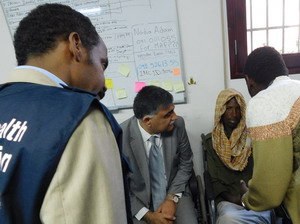Three assessment tools were utilized during the mission. These covered policy and institutional capacity at the national level, this assessment used a quantitative approach that was left to the Ministry of Health to complete. The self-assessment was verified with WHO and the Ministry of Health of Libya. Availability and delivery of services within healt hcare facilities, a quantitative approach was followed with a few probing questions to gain further insight from the perspectives of health care practitioners. Six tertiary care facilities and three primary health care facilities were assessed. Finally, focus groups were conducted with migrants assessing the availability and quality and access of public health care services.
The preliminary results of the assessment found a shortage in medicines and consumables for both host and migrant communities, and inconsistency in drugs needed versus those available for all diseases. There were shortages in health care workforce, primarily in nurses. In addition, there were no standard guidelines used for the areas assessed: infectious and communicable diseases, noncommunicable diseases, mental health, child health, reproductive and sexual health.
As host communities were suffering from these shortages, migrants too were experiencing even greater barriers with cost accrued due to the cost of medicines and tertiary care stays. Primary healtcare services were delivered free to all migrants and host community but for other services, a fee was taken and their passports were taken as a guarantee.








 4 April 2018 – WHO in collaboration with the Ministry of Health of Libya and the International Organization for Migration conducted an assessment on the public health needs of migrants and host communities in Libya, from 27 to 30 March 2018. WHO approaches the refugee and migrant health issue from the perspective of "leaving no one behind". As such a comprehensive approach was utilized to assess the health of migrants and host communities in Tripoli and the Sabha.
4 April 2018 – WHO in collaboration with the Ministry of Health of Libya and the International Organization for Migration conducted an assessment on the public health needs of migrants and host communities in Libya, from 27 to 30 March 2018. WHO approaches the refugee and migrant health issue from the perspective of "leaving no one behind". As such a comprehensive approach was utilized to assess the health of migrants and host communities in Tripoli and the Sabha.